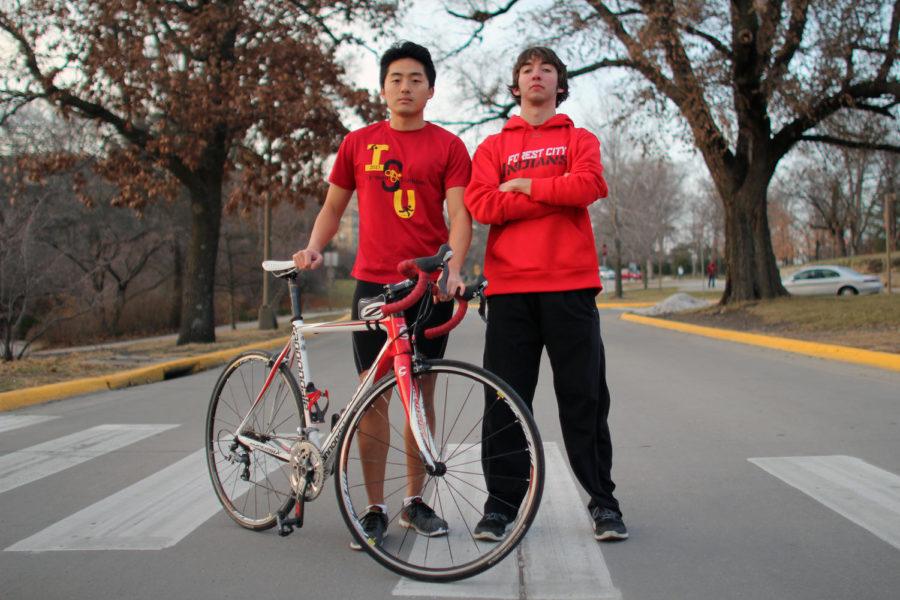70 days for 70,000 young adults diagnosed with cancer
Tyler Tweeten and Andrew Jirik, both sophomores in pre-business, will be riding across the country with the funds that they have raised for cancer research.
December 15, 2014
Two ISU students are enduring 70 days of physical hardship to help the 70,000 young adults who have cancer in the United States.
Tyler Tweeten and Andrew Jirik, both sophomores in pre-business, are training for the Ulman Cancer Fund’s 4k for Cancer, which will take place during the summer of 2015. Tweeten will run and Jirik will bike across the country.
“This whole thing is about raising awareness for cancer patients, especially for young adults,” Jirik said.
Tweeten and Jirik, members of Delta Sigma Phi fraternity, heard about the cause during a chapter meeting earlier this fall, when another member shared his own experience in the event.
Both Tweeten and Jirik have a personal connection with cancer. Tweeten’s grandmother had cancer for about two years before defeating the disease in 1999. Jirik’s cousin and uncle both lost their lives to cancer within the past four years.
Jirik is originally from Korea, but he grew up in the United States with his aunt in Minnesota. When his cousin and uncle, who both lived with the rest of his family back in Korea, passed from cancer, Jirik couldn’t make it back to be with his family.
“Even when I really cared for them, I couldn’t do anything because a trip back was too expensive,” Jirik said. “I want to show them I still care and I thought [the awareness bike ride] was a very good opportunity.”
Jirik is training for the 2,294 mile bike ride from Baltimore, Md., to San Diego, Calif., which will start in June. He builds his endurance by participating in the rowing and triathlon clubs at Iowa State and plans on adding swimming to his regimen. He is also preparing for a triathlon during winter break in Naples, Fla.
Tweeten will run about 12 miles each day along with 30 other team members for the run from San Francisco to New York City. The 2,906 mile relay style run will have participants on a rotation between running and riding in the help van. His training follows a strict marathon program and he plans to participate in a half and full marathon in the coming months.
Though his physical training is strict, Tweeten’s dietary guidelines are a bit more loose.
“I would love to follow a diet but that would require a lot of work,” Tweeten said. “If I see food I eat it.”
To participate for the cause, hopefuls must first apply to be accepted and wait for the Ulman Foundation to contact them for a phone interview.
Once Tweeten and Jirik were approved, the two created their own fundraising page. The Ulman Foundation helps them brainstorm fundraising ideas, as each participant much raise $4,500 before the event.
So far, the two have been using word of mouth to raise money and are hoping to plan a 5k at Iowa State to help raise additional funds.
As of press time, Jirik had raised $325 and Tweeten had raised about $400. Their first deadline is to raise $500 by Dec. 15 to stay on track with the payment plan Ulman created.
About 180 bikers and about 180 runners participate each year, raising about $1.62 million for the Ulman Cancer Fund.
The Ulman Cancer Fund was started by college student Doug Ulman in 1996 after his father died of cancer. Now, the organization’s main goal is to provide resources and support for young adults diagnosed with cancer.
Stephen Hersey, program manager for the Ulman Foundation awareness runs and bike rides, said this age group faces a different set of issues. They fall in a middle ground of medical care, where they can sometimes be too old to feel like a pediatric patient, but too young to stay in the same area as more elderly patients.
“Cancer itself generates lots of awareness,” Hersey said for the success of the event. “Our organization is focused on making sure people have resources to have a fulfilling life after diagnosis.”
College-aged students organize and execute the entire event, Hersey said.
Throughout the journey, participants will not stay in hotels but with volunteering members of each passing community.
“The thing that stands out the most is the generosity across the country,” Hersey said. “You get to meet, interact and talk with these communities. You’re not just driving through them.”
Teams will sometimes make a stop at local cancer treatment centers to meet and interact with cancer patients and their loved ones.
Though training to bike 70 to 130 miles each day or to run 12 miles a day is intense, the men said it is no comparison to dealing with cancer.
“I would rather run 4,000 miles across the country than doing what those [diagnosed with cancer] are doing,” Tweeten said. “No young adult should have to face cancer alone.”
Anyone can donate to either fundraising page by going to 4kforcancer.org.







